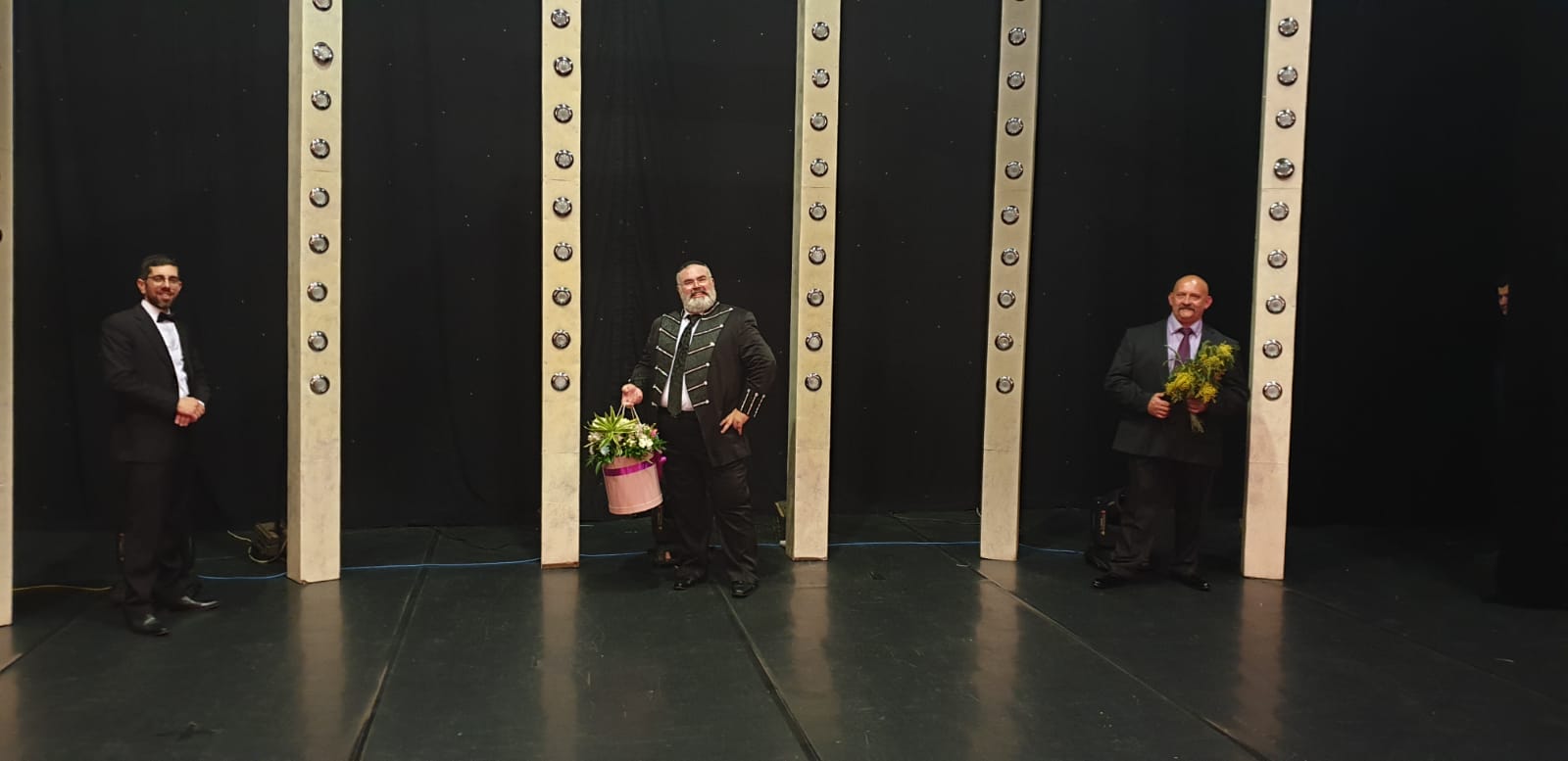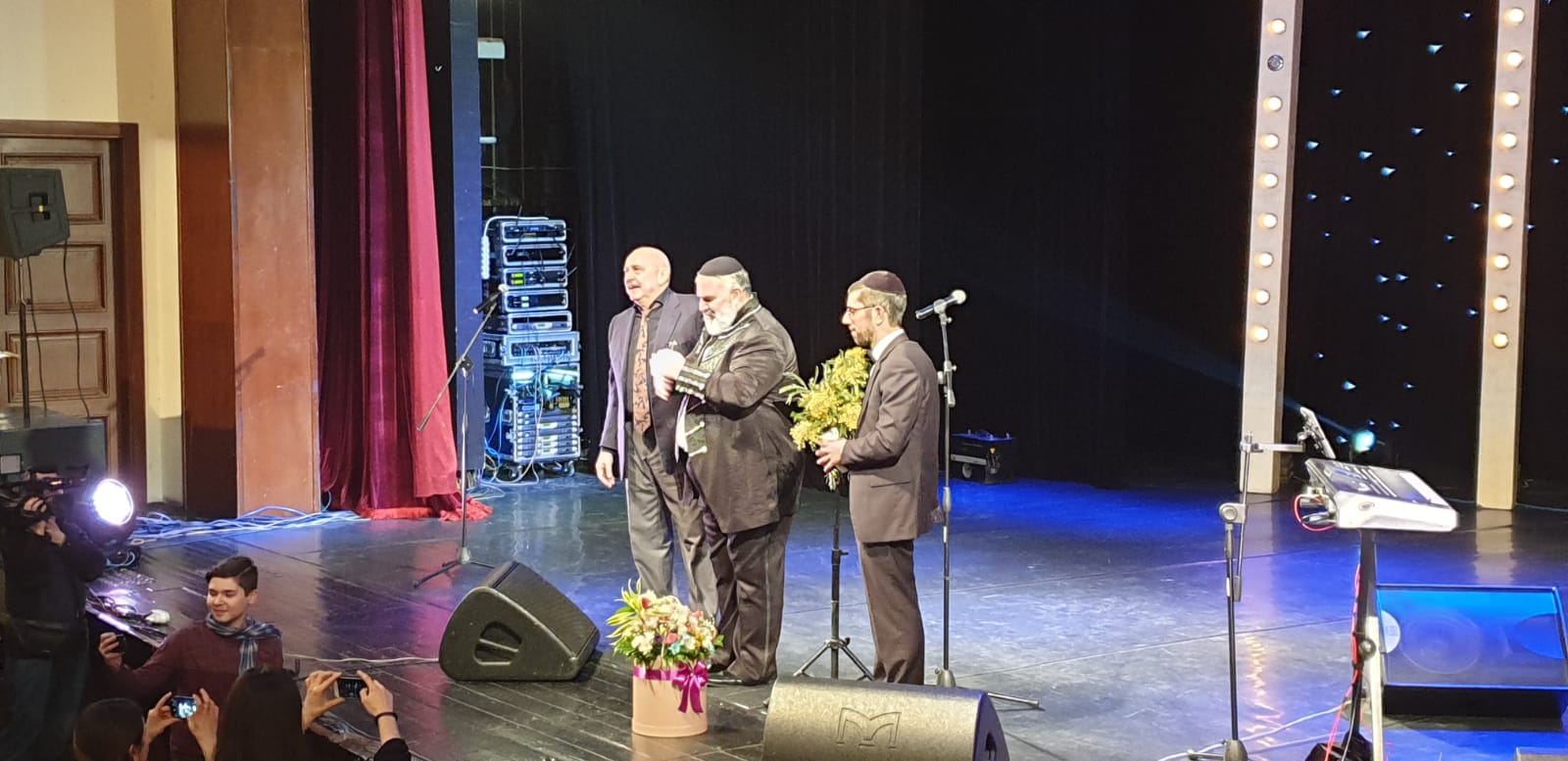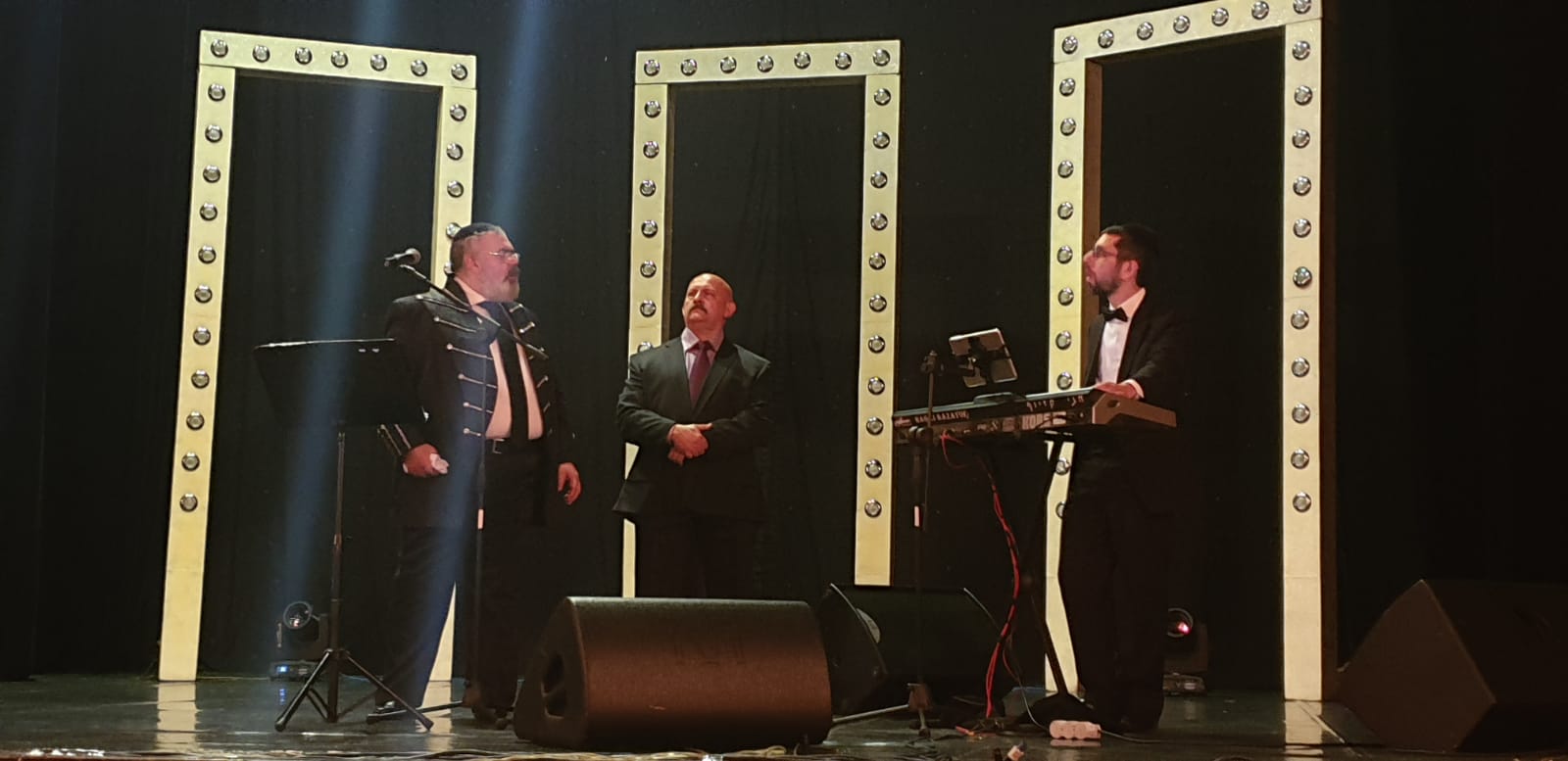"Hava Nagila" in Baku, the Capital of Azerbaijan: The Jewish Pavarotti Moved the Muslim Audience
Jewish singer Shimon Siboni recently performed at a special concert celebrating the spring holiday. "It's rare for Muslims to attend a concert with a Jewish man wearing a kippah, these are signs of redemption."
 (Photos: Yaakov Sharovski)
(Photos: Yaakov Sharovski)Our envoy in Azerbaijan: The singer Shimon Siboni, known as the Jewish Pavarotti, performed at a special concert in Baku, considered the Dubai of the Caucasus region. Shimon stated, "The songs in the concert were not in foreign languages or Italian, like usually sung for non-Jews, but I sang authentic Israeli songs like 'Jerusalem of Gold', 'Above the Summit of Mount Scopus', and more in a Muslim country. This is not a given."
The Republic of Azerbaijan is a country in the Caucasus near the Caspian Sea. It borders Russia to the north, Georgia and Armenia to the west, and Iran to the south. Azerbaijan has an ancient cultural heritage and is considered one of the Muslim countries with the highest religious tolerance. While the Azeri constitution does not define an official religion, most of the population is associated with the Shia branch. However, the Muslim identity of the citizens tends to be more based on ethnicity and culture.
Azerbaijan was the first Muslim country (after the Crimean People's Republic) to become a secular democratic republic (the Azerbaijan Democratic Republic). It was founded in 1918 and joined the Soviet Union in 1920. In 1991, with the dissolution of the Soviet Union, it once again became independent. Shortly after, during the Nagorno-Karabakh War, Armenia seized the Nagorno-Karabakh region from it, along with surrounding territories and several enclaves.
Recently, Shimon and his band returned from a performance in a country where most residents are Shia Muslims, making admiration for Israel quite surprising and unusual. Shimon recounts, "We were warmly welcomed, greatly honored for our arrival. Our stay was very comfortable, they attended to every detail and never left us alone." Shimon participated in the performance at the invitation of the Russian theater director, Alexander Sharovski.

How did the connection between you and the Russian theater manager form?
"It's a story in itself that began about three years ago when I first met a guy named Michael Sharovski, who later became my personal sports coach. We met at a gym where I was training to maintain a healthy lifestyle. During one of my exercises, he pointed out I wasn't doing it correctly and suggested meeting with him if I wanted to improve and work out properly.
Originally from Azerbaijan, Sharovski now lives in Israel, while his family resides there. His father manages the Russian academic theater in the capital city - Baku. The process took a long time due to all the bureaucracy surrounding the idea of such a show, but after two years, it came to fruition, and we traveled together for the concert. Today, he represents me across the southern Caucasus region.
The performance took place at the Russian Academy Theater in the capital, Baku. Shimon explains, "The concert was held in celebration of the spring holiday called 'Norooz', celebrated long before the establishment of Islam and is currently celebrated in Azerbaijan. President Ilham Aliyev supports multiculturalism, which is very rare for a Muslim country. He respects Israel greatly. I can say that 80% of the audience were Muslims. The event included esteemed government officials and VIPs who honored the special occasion."
A Jewish community resides in Azerbaijan, but Shimon was not able to visit them. "We were only there for a few days, went to the synagogue near our hotel. With all the rehearsals and preparations for the concert, we didn't see much else. I can say the country is stunningly beautiful, and there are many tourists. The mentality is very relaxed; everyone seems content and trouble-free, enjoying life."
What were you asked to sing: Piyyut, Cantorial, or Opera?
"The audience was very warm and welcoming, so much so that at the end of the concert, when I got off the stage, the whole crowd stood and applauded continuously until I had to go back on stage and perform 'Hava Nagila'. To my surprise, the entire audience joined in and sang along—it’s a popular song worldwide. Even at the Super Bowl in America, this song is performed. The most interesting part was that the songs I performed at the concert were not in a foreign language or Italian like typically sung for non-Jews, but here I sang authentic Israeli songs like 'Jerusalem of Gold', 'Above the Summit of Mount Scopus', and more in a Muslim country. It's not taken for granted. Additionally, I performed songs by Enrico Macias, Italian melodies in Hebrew, and flamenco in Spanish. It was a very unique experience, and the honor given to me was incredible.
The local media was enthusiastic, covered the event, and did stories about you—it's considered an unusual event?
"Certainly. People came out of curiosity to listen. When Muslims come to hear a concert with a Jewish man wearing a kippah, it's rare. I believe these are signs of redemption."
Shimon Siboni performs "Above the Summit of Mount Scopus". Watch:
"Faith in Our Sages Was Integral to Our Education"
Shimon, a father of four, was born 52 years ago in Casablanca, Morocco. He currently resides in Ramat Beit Shemesh, after immigrating to Israel from Canada 13 years ago. "My father, Yekutiel Avraham z"l, was a renowned and great cantor," he shares, "My father instilled in us, the children, cantorial music according to the concept of 'All my bones shall declare'. At that time, tradition and the synagogue were an integral part of our childhood landscape. We, the children, breathed the synagogue atmosphere. I absorbed the love of liturgical singing from a young age. I started singing at the age of 6-7, initially in synagogues with my father, especially during the High Holy Days. We sang with great cantors, including Yosef Amr (Jo Amar z"l). My brother and I would chant the songs of prayer, while my father insisted that we learn the rules of grammar, the correct pronunciations, and, of course, know the meaning of the text."

Currently, what role does Torah play in your life?
"Hashem granted me the privilege to dedicate the first part of my day to Torah study. I begin my studies with 'Chok LeYisrael', which includes Talmud, Mishnah, Tanach, Zohar, and practical Halacha. I study this with great depth, which takes up a significant part of my learning. I dearly love insights into wisdom, innovations, gematrias, etc."
How do you see the connection between Torah and Piyyut?
"Piyyut is the bridge to devotion to the Creator and the observance of Torah and mitzvot. The piyyut 'Yafeh V'Tam' is the classic example of this connection, where the depth of the words brings joy to people simply by its singing. If we examine the lyrics, we can notice: 'Beautiful and flawless, complete Torah, the pleasant one, who can delve into your secret, the secret of the living God' - this expresses the close connection between piyyut and the holy Torah, as well described by R’ Shlomo Abutbul zt"l, the author of the piyyut."
Throughout his musical career, which runs parallel abroad, Shimon is accompanied by the Jewish faith he grew up with. "The strong faith in the Creator and the righteous, as in 'And they believed in Hashem and in Moses His servant', was the complete faith that accompanied me throughout my journey. If I can give an example in a nutshell—several times during performances and concerts held abroad, I received big offers to enter the international entertainment world. These were offers hard to resist, but thanks to the faith in the Creator and the righteous, I was given the strength to refuse because something wasn’t kosher there—whether it was observing Shabbat or performing alongside women, some of the greatest singers in the world. Thank Hashem, He granted me the merit to withstand the test successfully. As the saying goes: 'He who believes doesn't fear'.

Ahead of Shavuot, Siboni is set to embark on a new project – recording the entire Book of Psalms in the Tangier style. "My late father was an expert in Psalms. He taught me and my brother the cantillation. We worked on the project for two years with guitar artist Eli Tzurya, who is also a creator and composer. We performed the entire book accompanied by a real harp and guitars. Unfortunately, this authentic melody is fading away, and I am trying to restore it to its former glory." Siboni shares that when the Rishon LeZion, the Chief Rabbi of Jerusalem Rabbi Shlomo Moshe Amar, heard about the project, he blessed it for success. Indeed, the Psalms were recorded over 11 and a half hours of listening to 150 psalms. Siboni: "I hope to share this important project with the entire people of Israel."
What is the next goal you aspire to achieve now?
"I would very much like and aspire to represent the State of Israel to President Putin or even Trump. I hope to fulfill the verse from Deuteronomy: 'And all the peoples of the earth will see that Hashem’s Name is called upon you, and they will fear you.'"

